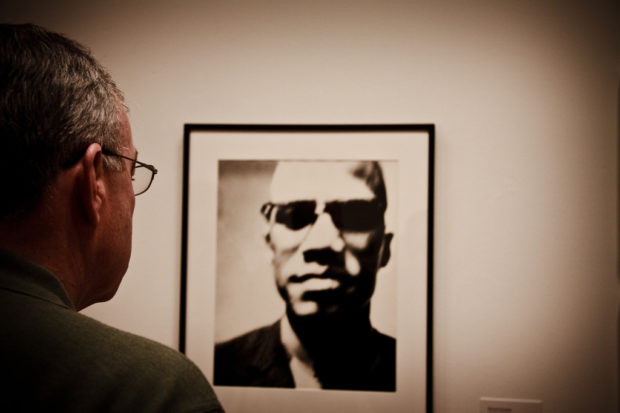
By Jonathan Luevanos
Malcolm X was an African-American intellectual who gave the African-American people in the 1960s a formula for understanding their situations within legal-political institutions and their own communities. Malcolm was not sympathetic to the wave of civil rights reforms especially because he thought that the institutional reforms were incapable of addressing the history of African Americans or oppressed peoples. He thought that the American legal-political systems were grounded in racism and, consequently, one must step outside of the institutional biases of civil rights reform and instead pursue international human rights reforms.
Malcolm was not in favor of the pacifist civil rights movement because he thought that pacifism inspired docility and actually contributed to the sustainment of institutional racism. Therefore, Malcolm proclaimed justice by any means necessary as ways to affirm one’s culture and political identity while defending oneself against the austere forces of coercion and oppression in general.
American slavery historically has functioned in an institutional manner through the manipulation of legal-political processes that facilitate economic exploitation. During slavery, the slave plantations of the South served as the spatial vehicles for the legal-political process, economic activity and the formation of the master and slaves.
To begin to understand the nature of Malcolm’s philosophy, a clear distinction between the historical forces of production must be established. For Malcolm, there are three kinds of people: the slave master (who is White, Caucasian), the house slave and the field slave. All three kinds of people historically interacted within the slave plantation and they still exist today.
The slave master was a Caucasian plantation owner who subjected African Americans to strenuous labor for the sole purpose of making profit. There were certain distinctive conditions that identified or were responsible for the formation of the lives of the house and field slaves in relation to the master.
The house slave lived in a nice house with the master. The house slave loved helping the master sustain the slave plantation. If the master got sick, the house slave hoped that the master would get better. This is because the house slave loved the master more than the master loved himself. The house slave hated the thought of separating from the master.
The field slave did not live with the master but lived outside of the master’s house in a hut. The field slave hated being a slave and especially hated the master. If something happened to the master or if the master got sick, the field slave hoped that the master died. If the plantation caught on fire, the field slave hoped that the plantation would burn down.
Malcolm X claimed that he was a field slave and was frustrated at the fact that many prominent civil rights leaders of his time were house slaves who worked alongside the masters. The ethics of peace and pacifist nonviolence that were encouraged by the civil rights leaders inspired docility and conformism, which for Malcolm was dangerous because it did not allow true values such as self-determination, dignity, equality and justice to manifest. The values of house slaves are still prominent today.
On June 17, 2015, Dylan Roof, a White supremacist, walked into Emanuel African Methodist Episcopal Church in Charleston, S.C., sat in for a Bible study, and shot and killed nine African-American individuals. Senior pastor of the congregation and state senator Clementa C. Pinckney was also shot and killed.
James Comey, director of the Federal Bureau Investigation (FBI), has been criticized because he refuses to call the act “terrorism” or “politically inspired.” Meanwhile, President Obama remains faithful in his pompous position and has further been able to calm the masses in the wake of the massacre.
On June 26, President Obama delivered the eulogy for the late pastor Pinckney. Obama, along with the African-American community members in attendance and the media who covered the stories, deliberately proclaimed peace, love and forgiveness as the proper responses for such horrific acts of racial violence upon innocent people.
But, one does not need to reference the Charleston massacre in order to realize the absurd nature in which our communities behave and respond. Immediate local relevance can be conceived just by paying attention to some of the social inconsistencies that we witness everyday in Fresno.
Faith in Community (FIC), for example, is an exemplary organization that works with the Fresno Police Department (FPD), an organization that terrorizes the people of Fresno. The FIC conducts “Night Walks” in communities with a history of violence and focuses on prayer, peace and establishing positive relationships with Fresno residents. Although the FIC is actively engaged in the fight for restorative justice by raising awareness and mobilizing clergy and lay leaders, the relationship that the FIC has with the FPD contradicts the values that it aspires to uphold, which are to work “towards a more just, compassionate, equitable, and thriving city of Fresno.” Ultimately, the FIC only contributes to the sustainment of a master-slave system. Consequently, it does not become difficult to realize that Malcolm X’s identification of house slaves is extremely relevant today both at the national and local level.
In a social era that i s overwhelmingly shaped by hegemonic forces of coercion, control and normalization, advocates of nonviolent pacifism become part of the problem because their behavior breeds docility and conformism within an aggressive system that perpetually controls people. Pacifists reinforce the racism and inequality that is apparent everyday between, for example, law enforcement in Fresno County and the people of Fresno.
The people of Fresno must realize that the legal-political processes are flawed, and therefore the people need to find dignity and justice by any means necessary.
*****
Jonathan Luevanos can be reached at jluevanosfelix@gmail.com.
